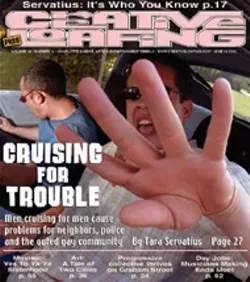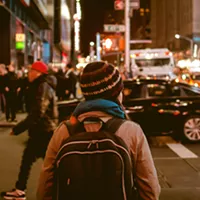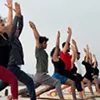Cruising For Trouble
Men cruising for men cause problems for neighbors, police and the outed gay community
"I was so pissed off," Smith said. But when she set out to do something about it, she couldn't find anyone willing to listen. Douglas International Airport Aviation Director Jerry Orr wouldn't return her phone calls and told her to call the airport police.
"The head of airport police said they have as much right as I do to be up there," said Smith. "I'll be damned if anyone has a right to subject me to stepping on a pair of their underwear. Now it's all queers up there all the time."
Smith says she now walks on the treadmill at home.
A woman named Jackie and her husband gave up their walks at the overlook trail after she saw a man wearing only a shirt standing by one of the cars in the parking lot. The couple was used to the condoms that sometimes littered parts of the trail, but outright nudity was too much. They stopped taking their kids up there as well, and found a new spot to exercise.
The official position of the airport police, who patrol the area, is that the overlook is a safe, family-oriented place to walk, picnic or watch the airplanes take off. But catch a cop or his friends off the record and you'll hear a different story. When one officer shined his light into a car he pulled over near the overlook, he discovered that the man inside was completely naked. The man told the officer that he was changing clothes. The officer pulled the man out of the car and made him put his clothes back on.
"We know it goes on," says another officer. "We patrol the overlook, but we don't sit there and watch it."
Tony Merritt, who likes to jog along the overlook trail, says he now understands what women go through when they walk by a construction site. He says men have heckled him on more than one occasion when he jogged by the overlook. The same thing has happened to Robert Davenport.
"I'd be jogging out there and they'd make passes from the overlook area to where the people park to walk," Davenport said. "They'll scream out their windows and make remarks like a man would to a woman, 'Woo, hey baby' and crap like that. Just enough to piss you off. It's definitely not a comfortable feeling."
But it's not that way for everyone. Unless you know what to look for, or happen to be mistaken for one of the regulars who park in the area, the subtle courtship rituals -- called "cruising" -- that take place at the overlook might escape your notice completely.
It works like this. At lunch and after work hours, cars driven by lone men pour into the parking lot of the overlook. Families and sightseers usually park right up against the fence at the front of the lot to watch the planes take off. Single men driving nondescript vehicles line the parking spaces near the back of the lot, leaving the spaces next to them vacant so other cars can pull in beside them. The middle of the lot serves as a kind of catwalk. Cruisers drive their cars into the lot and turn left, slowly parading past the line of parked cars in the back of the lot, checking out the men seated in them. Sometimes, if a cruiser wants a better look, he'll loop behind the other cruisers parked in the back of the lot and continually drive in a circle around the parked cars until he pulls in next to another car or moves on.
After circling a few times, if they don't see anything they like, men parked at the back of the lot often pull out and follow a predictable route that includes a small parking lot for pedestrians just outside the overlook and an adult bookstore called Highway 74 News and Video on the corner of Barry Drive and Wilkinson Boulevard.
The overlook is just one of dozens of hotspots around Charlotte where men meet surreptitiously for sex. Despite regular sting operations by Charlotte-Mecklenburg vice officers, parks like Kilbourne, Freedom and Park Road also attract a fair amount of traffic.
Cruisers don't seem out of place because they often look like they belong in these places. They're often older men who have none of the mannerisms of gay culture that homosexual men often adopt. They drive family type vehicles, because many of them are married. They don't go to gay bars because they're afraid someone they know might find out about it.
Sympathy and resentment
Alan Rosenberg, President of the Gay and Lesbian Switchboard of Charlotte, counsels a group of men struggling with their homosexuality. Like so many men in their position, he began cruising for sex with other men while still trapped in a marriage to his wife of 25 years. Rosenberg says his sexual journey began in a health club, where he had his first sexual experience with another man. It was totally by chance that the man sought him out, Rosenberg said. Rosenberg was full of questions. Where did men go to meet for sex? What were the signals they used to communicate their intentions to each other?
For the last seven years of his marriage, Rosenberg prowled the public and private places the man had told him about, as well as others he found on his own. Before he knew it, he says, he was out of control.
"It became a compulsive behavior," Rosenberg says. "I'd go to the bookstore where they had private booths and you used slugs or coins to rent them. After I'd go there I'd be so disgusted that I'd throw the slugs away and think, 'Here I am, this honest guy doing something disgusting.' But I'd be back there four hours later."
It took seven years for Rosenberg to work up the courage to tell his wife, children and friends that he was gay. But even after he came out, Rosenberg continued to cruise for a while. Like many men of his generation -- Rosenberg is now in his 70s -- he had had little exposure to outed gay men or gay culture. The transition was a difficult one for him.
"I had had gay sex, but I had no idea what it meant to be a gay man," he says. "I had to get adjusted to it." Often, he says, other gay men made him feel uncomfortable.
"If they were straight-appearing and masculine like the people I was accustomed to being with, it was fine, but if they were flamboyant I was uncomfortable with that," he says.
Rosenberg's experience with cruising and as a counselor has led him to the conclusion that many of the men who cruise may not yet have admitted to themselves that they are gay. Many of them, he says, probably have homophobic attitudes toward openly gay men.
"A lot of these guys going to the park don't think of themselves as gay," said Rosenberg. "They also feel it is not cheating on their wives if they are with another man."
Rosenberg's story is a familiar one to Charlotte psychologist Bob Barret.
"There is a married population of men out there who seek sexual contact with other men," Barret says. "But most of them don't want to interact with the gay community."
Barret blames much of this closeted behavior on what he terms society's repressive view of homosexuality but at the same time insists that it is not appropriate for gay men to be having sexual encounters in public places such as parks. It's risky, he says, and it can prevent the formation of healthy relationships.
"Many gay men tend to have their early sexual experiences in high-risk situations," says Barret. "They pair the arousal from the risk they're taking with their sexual arousal. Then when someone is having sex in a relationship, sometimes they aren't satisfied. They want the high edge to return."
Barret says the overt promiscuity of the cruising culture may have its roots in the self-doubt of many closeted homosexual men.
"Many gay men grow up with pretty strong doubts about their masculinity," says Barret. "One way they deal with that is to have sex with a lot of people. That sort of drive is problematic."
There is a sympathy that borders on resentment toward the cruisers by leaders of the gay community. Gay and lesbian leaders would like to strike down crime-against-nature laws often used to prosecute cruisers caught by police in parks and other public places, but at the same time, they insist that the behavior of cruising is unacceptable. Some even seem to resent it because it reflects badly upon outed gay men who socialize more publicly.
"It is really unfortunate that people think they have to hide their gayness and think that they have to seek out sex with a total stranger," said longtime gay activist Don King. "That's pathetic."
King says the situation the gay cruisers put themselves in is parallel to the one straight men who are married put themselves into -- except that those men have semi-accepted places to go seek out extracurricular sexual partners, like strip bars or other bars that their friends don't frequent.
"These men fear the loss of their job and loss of security in life, but they're looking for it so hard, the desperation is there so much that they are willing to put up with the risk of arrest," said King. "They are left with cruising places like the overlook which makes the people who live nearby feel like they are in danger."
Airport police stretched thin
The whole situation is indeed rough on cruising spots' neighbors, as well as the cruisers themselves and, if they are caught, their families. But it also leaves people like police, park officials and airport Aviation Director Jerry Orr in a tough position. Orr says he is well aware of the numerous phone calls his office has had from area residents complaining about the problem, many of who say that Orr didn't return their calls.
"It's a huge problem," says Orr. "I don't know what could be done about it. We could close the overlook down. That solves the problem but it is rather draconian."
Orr says the airport police, which have jurisdiction over the overlook, are understaffed and too consumed with post-September 11 security issues to address the problem. The airport's 26 uniformed officers are responsible for patrolling the entire 6,000 acres over which the airport sprawls.
"They spend most of their time doing FAA security functions," says Orr. Orr says that he would be willing to work with the Charlotte-Mecklenburg police to solve the problem. Officers say that the department's vice unit has conducted sting operations there in the past, but that the problem always returns.
Robert, an area resident who lives off Walkers Ferry Road, says he called Orr to complain after he saw a man at the overlook wearing only yellow bikini underwear as he drove by with his young daughter in the car.
"It's not that they can't do anything about it, they just won't," Robert says. "It's just a matter of patrolling the area."
But even Robert, who says he doesn't like gay people -- they have a severe problem, he says -- understands the situation Orr is in. As much as Robert would like to feel comfortable taking his family up to the overlook, he says that cracking down on the men won't get rid of the problem, but will just move it elsewhere. And since September 11, he says, he doubts the cruising at the overlook is a high priority for Orr.
How high a priority clearing cruisers out of parks and other public places is for the Charlotte-Mecklenburg Police Department is hard to tell. The department doesn't keep statistics on how many arrests its sting operations garner and is close-lipped about how many sting operations it conducts.
Major KD Williams refused to tell Creative Loafing how officers conduct sting operations to catch cruisers. When asked why he would not divulge this information, he said, "Because I just don't want to."
"We are not going to discuss our tactics with the media," he said. Other officers were more willing to talk provided we didn't use their names. They say the department typically conducts sting operations after receiving large numbers of complaints from area residents near a park or other public place. The officers' concern, they say, is not just the complaints or the cruising itself, but the prostitution, theft, drug activity and possible assault they say often goes along with it.
Sometimes officers say they get lucky and stumble upon men in the act, but most of the time cops have to go undercover to catch cruisers. Contrary to the way cops say they are often stereotyped, the job of undercover cruiser isn't exactly a popular one. The guy who winds up with it usually takes a fair amount of ribbing from his fellow officers. Often it is younger, attractive cops of lower rank or seniority who are selected. They dress somewhat seductively, in tight t-shirts and pants. They claim they systematically wander the area in question until they're propositioned, then they make an arrest.
But two officers who've participated in these stings say it's not something they're comfortable with. It's sometimes awkward, they say, and they're often afraid that the department won't back them if an arrest leads to negative media attention.
Old laws and public humiliation
They're right to worry. John Boddie, an attorney who is the board chairman of the North Carolina ACLU, says his organization is looking for a test case to challenge the state's crime against nature laws. According to state court interpretation, anal and oral sex are illegal for both heterosexuals and homosexuals in North Carolina. But gay activists insist that the law, which they call stupid, is unevenly enforced and used to target gay men, in part because police have so few legal tools at their disposal to clear out popular public cruising places.
That's certainly true in Mecklenburg County, where it's technically not illegal to have sex in a park. County statutes governing parks forbid undressing on park property except in tents and bathhouses. They also forbid willful exposure of buttocks or genitals to another person in the park. According to state statute, it is illegal to solicit someone for sex or crimes against nature. To actually commit crimes against nature " basically anything other than heterosexual intercourse -- is a felony.
The police say that forces them to use solicitation and crime-against-nature laws to nab cruisers.
"The only law the police have to deal with it is a stupid law that wasn't meant for this purpose," said Boddie. "If the legislature would repeal this old, archaic law and replace it with something that dealt with public sexual acts, the police would not have to go through all this. But our legislature doesn't want to deal with sex."
It may be years before the legislature addresses the law. Ian Palmquist, the assistant director of Equality North Carolina, says repeated attempts to strike down the law through the legislature, of which there are several every year, have died in committee. And Charlotte attorney Connie Vetter says that finding a test case to take through the courts won't be as easy as it sounds.
"To get to the Supreme Court you have to be willing to lose one round and be convicted," said Vetter. "You need to find a plaintiff, and the right plaintiff."
Given the solitary nature of cruising, none have stepped forward so far. That leaves District Attorney Peter Gilchrist's office to deal with a few hundred solicitation cases each year, some of which stem from cruising.
"We have had lots of problems with bathrooms in public parks and rest stops on the interstates," said Gilchrist. "I feel sorry for people who live near these places and I wish they weren't affected."
Most of the time, men who cruise for other men wind up being charged with misdemeanor solicitation. Gilchrist says that a cruising arrest could result in felony charges if the plaintiff is caught in the act of committing a crime against nature, but if it is a first offense, the person will usually be allowed to plead to a misdemeanor or be given deferred prosecution, a kind of probationary period in which no prosecution will occur unless the individual is later charged with separate crimes.
Most of the time, Gilchrist says, those convicted of cruising-related crimes wind up doing community service as part of their punishments. More devastating than that, though, is the fact that they often wind up being ordered by the courts to inform their spouses that they have been convicted. In some cases where these men have what Gilchrist calls "sensitive jobs," like teaching or directing a church choir, they are ordered to tell their employer about the conviction as part of their punishment and are barred from returning to the spot where they were caught, particularly if it is a popular cruising locale.
"You would have to have been arrested and convicted a number of times before you were sent to jail," said Gilchrist.
Part of the humiliation tied to these kinds of arrests is that the cases are read and heard in open court, essentially in traffic and misdemeanor courtrooms, which are typically packed.
"The sad thing is the embarrassment that comes from the arrest," said Gilchrist. "I get calls occasionally from someone who may be prominent in the community and is absolutely humiliated. I tell him to come to court and apply for deferred prosecution. Just warn people of the potential embarrassment they have subjected themselves to." *
Speaking of News_.html, 3.00000
-

You're Getting Warmer
Dec 12, 2007 -
When White Folks Mess Up
Dec 5, 2007 -

Charlotte Bobcats Arena
Dec 5, 2007 - More »















